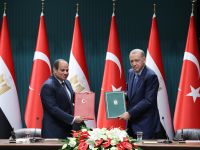Stock markets reeled in horror, oil and gold prices soared and currencies were thrown into turmoil Tuesday, September 11, after a wave of terrorist attacks in the United States wrought havoc at the heart of global capitalism.
European share prices collapsed in their worst one-day fall for years, as chaos ensued after airplanes ploughed into the World Trade Center and the Pentagon in the world's worst terrorist attack.
The dollar sagged heavily, even though US markets remained shut, while oil prices surged four dollars a barrel to scale $31 a barrel at one point. Gold benefited from its safe-haven tag to jump $20 an ounce to top $291 an ounce.
Dealing in all markets turned frantic as traders tried to comprehend the extraordinary impact that the plane crashes would have on the world's business community. "The market reaction was inevitable to these extraordinary scenes of horror," said Jeremy Batstone, chief economist with NatWest Stockbrokers in London.
"Share prices fell sharply, oil prices shot up, but currencies were volatile because there is no one there to sell the dollar," he said. "The implications are going to be very far-reaching economically and commercially for months, if not years."
The immediate implications were a 5.7-percent slump in London's FTSE 100 index, a 8.5-percent nosedive in the German DAX index and a 7.4-percent crash in the Paris CAC 40 index.
Trading was interrupted in several European centers as traders left their desks to view the carnage on television screens, and buildings were evacuated as a precaution. The Frankfurt stock exchange was evacuated on Tuesday evening and trading ended 45 minutes early, following a bomb threat, which turned out to be false alarm, a spokesman said.
The terror attacks dealt a hammer blow to the dollar, which slumped to 118.85 yen and 0.9150 to the euro. But the move was mitigated by the fact that no one was dealing in New York.
Oil prices surged to their highest level this year, as analysts mulled whether the terrorist attacks could destabilize the oil market. Brent October crude futures soared to $31.05 a barrel before easing back to $29.30.
"The natural reaction is to expect the US to respond which would then put the US against the Arab world which of course means a very difficult position in terms of security of world oil supplies," said Lawrence Eagles, a commodities expert with the GNI brokerage.
The London oil market, which closed early Tuesday because of the attacks in the US, will maintain normal opening hours for the rest of the week, a spokeswoman for the International Petroleum Exchange said.
Gold strengthened on the back of its traditional status as a safe port in a storm. One analyst spoke of "panic buying" as investors deserted more risky instruments and sought out the precious metal. But many analysts said that the response of most markets and traders on Tuesday was just a knee-jerk reaction.
They said the financial community was not just devastated by pictures of their stranded colleagues in the ill-fated World Trade Center, but was incapable of working out what it meant for the business world. "This is an attack on the center of world capitalism," said Mark Austin, an economist with HSBC.
"We are very likely to have a period where the world economy goes into recession now because the risks premium will go up everywhere, the cost of doing business will go up because of the increased security that is going to be required just to travel around," he said.
That much was reflected in the share price slump, in which banks, insurance companies and airlines were the worst affected. Others were searching for historical comparisons, noting that the most recent drama of this magnitude to hit world markets — the 1990 Gulf War — turned a downturn into a full-blown recession.
"The war against Iraq over Kuwait precipitated a recession in the United States," noted Yves Maillot, head of equity investment management at Group Robeco Gestion in Paris. "And overall it prolonged the slowdown which lasted about 18 months — it had effect on general sentiment, on the consumer." ― (AFP, London)
by Mark Rice-Oxley
© Agence France Presse 2001
© 2001 Mena Report (www.menareport.com)







